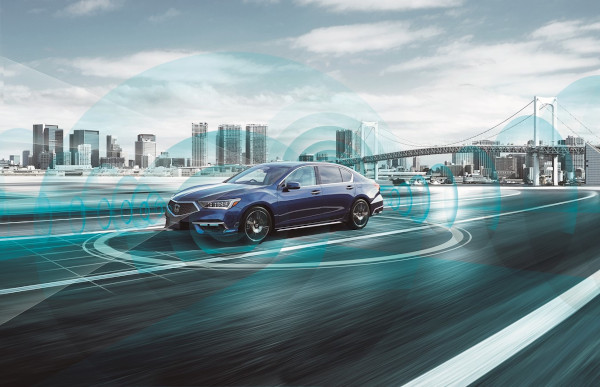- Honda launches new Honda SENSING Elite safety system
- Fitted to Honda Legend Hybrid EX available for lease in Japan
- Honda SENSING Elite features ‘Traffic Jam Pilot’ function, first Level 3 automated technology to be recognized by Japanese authorities
- Other features include ‘Hands-off’ and ‘Emergency Stop Assist’
Honda Motor Co., Ltd. will begin lease sales in Japan, on March 5, 2021, of the Honda Legend EX equipped with Honda SENSING Elite.
In its effort to realise a collision-free society based on its global safety slogan, “Safety for Everyone,” Honda has long been at the forefront of the research and development of safety technologies. The introduction of Legend equipped with the Honda SENSING Elite represents the next step forward in the area of advanced safety technology.
Honda SENSING Elite builds on the functionality of Honda SENSING, which is fitted as standard throughout Honda’s European automobile range.

One of the “elite” technologies featured is the “Traffic Jam Pilot” function, an advanced technology qualifying for Level 3 automated driving (conditional automated driving in limited area), for which Honda has received type designation from the Japanese Ministry of Land, Infrastructure, Transport and Tourism (MLIT)*1. Traffic Jam Pilot technology enables the automated driving system to drive the vehicle under certain conditions, instead of the driver, such as when the vehicle is in congested traffic on an expressway*2.
For vehicle control, the system determines the position of the vehicle and road conditions using data from the 3-dimensional high-definition maps and the global navigation satellite system (GNSS*3), detecting the vehicle’s 360-degree surroundings using several external sensors. At the same time, the system tracks the conditions of the driver using the monitoring camera mounted inside the vehicle. Based on such a wide range of information, the main ECU makes proper recognitions, predictions and decisions and applies a high-level control to acceleration, braking and steering inputs to assist the driver to achieve high-quality and smooth driving.
Placing the highest priority on safety and reliability, the system development employed simulations where a total of approximately 10 million pattens of possible real-world situations were simulated, and several demonstration tests were conducted while driving test vehicles on expressways for a total of approximately 1.3 million kilometers (800,000 miles). Moreover, the system incorporates redundant system design to ensure safety and reliability in the event of a problem with any of the devices.
Exterior equipment designed exclusively for this all-new Legend model includes blue accessory lights and a dedicated aluminium wheel. Several sensors are embedded to make them less noticeable so that an appearance befitting a flagship sedan are further enhanced while discreetly calling out the fact that it is a vehicle equipped with automated driving equipment.
Interior equipment exclusive to this model includes Honda SENSING Elite indicator lights which feature carefully selected respective positions, sizes, colours, brightness and other details, as well as the 12.3-inch full-LCD graphic meter. This equipment was adopted to ensure intuitive understanding of operation status, current situation, and any requests to transfer back control to the driver.
- Adaptive in Lane Driving:
The system assists the driving and in following a car in front within a lane. The system drives the vehicle along the middle of the lane while maintaining the pre-set vehicle speed. When there is a car in front, the system assists in following while maintaining a proper following distance.
- Active Lane Change Assist with Hands-off Function
While driving using the Adaptive in Lane Driving, when the driver confirms safe surroundings and puts on the turn signal, the system assists acceleration/deceleration and steering for the lane change.
- Active Lane Change with Hands-off Function
While driving using the Adaptive in Lane Driving, when the driver switches on the Active Lane Change with Hands-off Function, the system assesses the situation and assists the lane change and/or passing of the other vehicle under certain conditions. When the system detects a car in front being driven at low speed, the system notifies the driver and then assists the passing and returning to the original lane.
Traffic Jam Pilot
While driving using the Adaptive in Lane Driving, when the vehicle gets caught in traffic congestion under certain conditions, the system takes control of acceleration, braking and steering while monitoring the vehicle’s surroundings on behalf of the driver. The system drives, stops, and resumes driving within the same lane while maintaining a proper following distance in accordance with the speed of the vehicle in front. While the vehicle is under the control of the system, the driver can watch television/DVD on the navigation screen or operate the navigation system to search for a destination address, which helps mitigate driver fatigue and stress while driving in a traffic jam.
- Emergency Stop Assist:
When the driver continues to be unresponsive to the system’s requests for a handover (the transfer of control back to the driver), the system assists deceleration and stopping of the vehicle by making lane change(s) to the outermost lane or the shoulder of the road. To be more specific, in case the driver does not respond to the system’s handover requests as the Traffic Jam Pilot/Hands-off Function will be disengaged, the system further urges the driver to respond to the handover request using visual, auditory and tactile alerts including escalated alarm sounds and vibration on the driver’s seatbelt. If the driver continues to be unresponsive, the system will assist deceleration and stopping of the vehicle while alerting other vehicles around using hazard lights and the horn. When there is a road shoulder, the system assists deceleration and lane changes until the vehicle reaches the shoulder of the road for a safe stop. *4
Human-Machine Interface (HMI)
The interface enables the driver to instantaneously recognize operating status of the system, the driving situation and the handover requests issued by the system. Honda SENSING Elite indicator lights are positioned on the steering wheel, the top part of the navigation screen and glovebox. When the Hands-off Function is activated, the indicator light on the steering wheel illuminates, and when Traffic Jam Pilot is activated other indicator lights also come on with a blue light. When the system requests the handover, all indicator lights change their color to orange and blink to send an easy-to-understand message to the driver. The large 12.3-inch, full-LCD meter also displays the operating status of the system, driving situation and the handover requests in a simple yet expressive manner.
Limited lease sales of the Honda Legend Hybrid EX commence in Japan from 5 March.
*1 Reception of the type designation was announced on November 11. 2020.
Please refer to the press release: https://global.honda/newsroom/news/2020/4201111eng.html.
*2 There is a limit to the capabilities (e.g. recognition capability and control capability) of individual functions of Honda SENSING Elite. Please do not overestimate the capabilities of each Honda SENSING Elite function and drive safely while paying constant attention to your surroundings. Please remain in condition where you can respond to the handover request issued by the system, and immediately resume driving upon the handover request.
*3 GNSS stands for Global Navigation Satellite System, a collective name for satellite positioning, navigation and timing (PNT) systems.
*4 Depending on the situation, the system may stop the vehicle without making lane change(s).



